Women Going Their Own Way: A Collage Poetry Collection
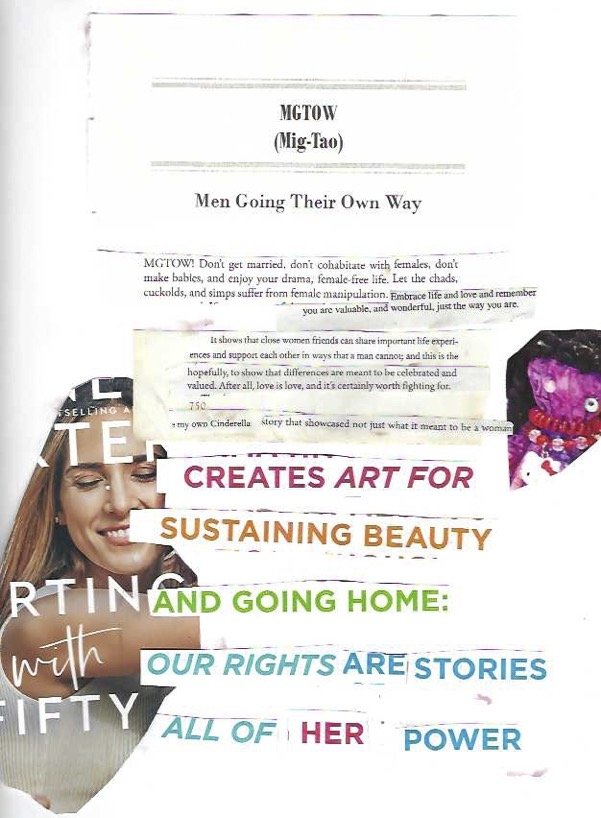
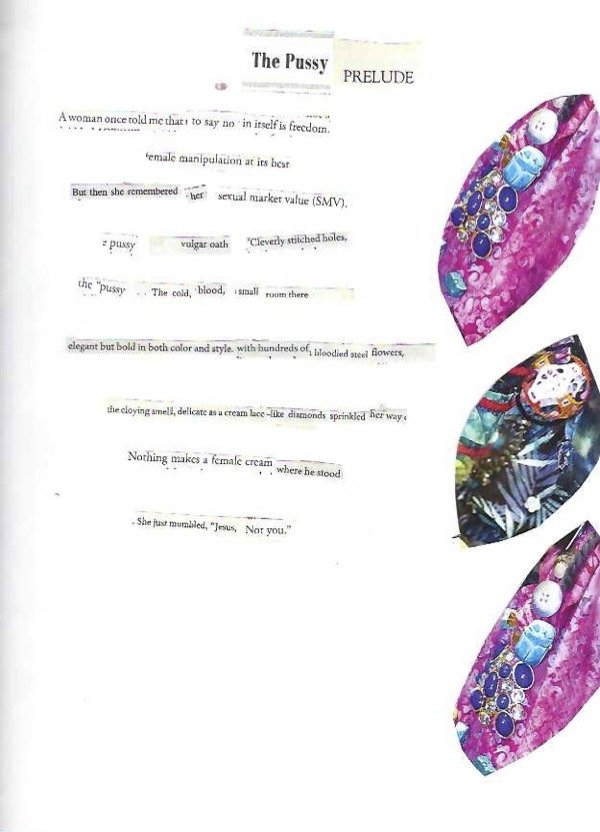

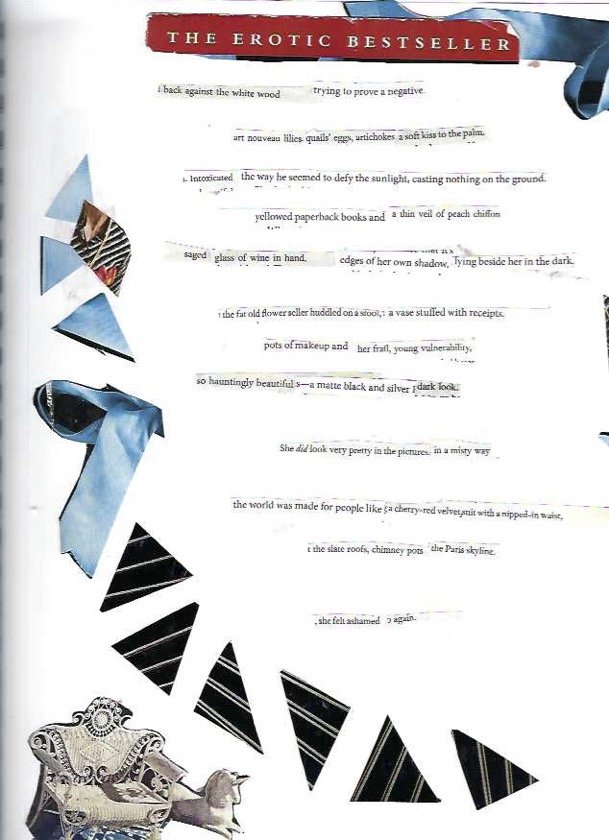
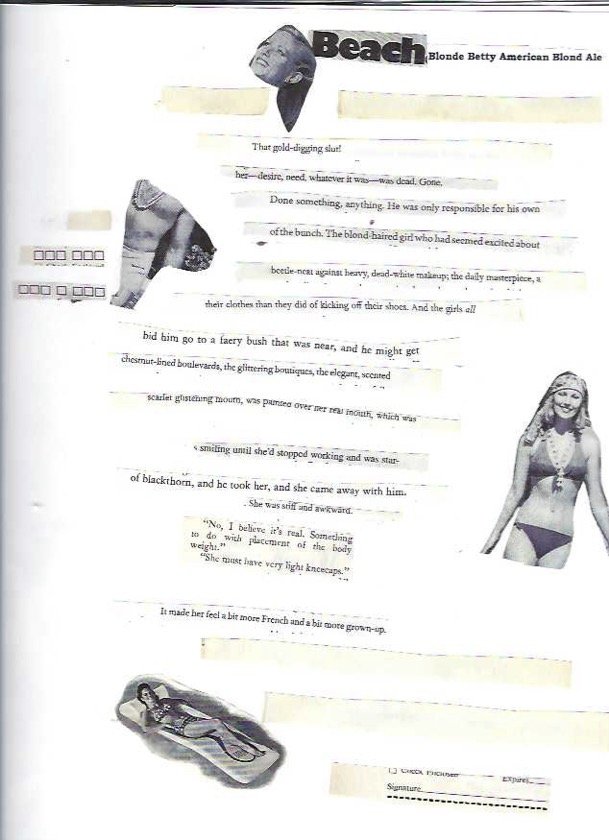
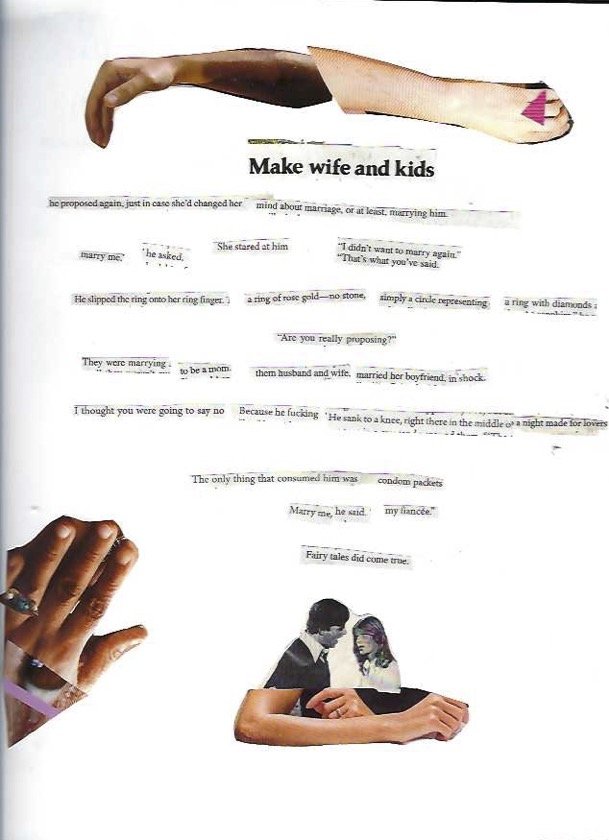
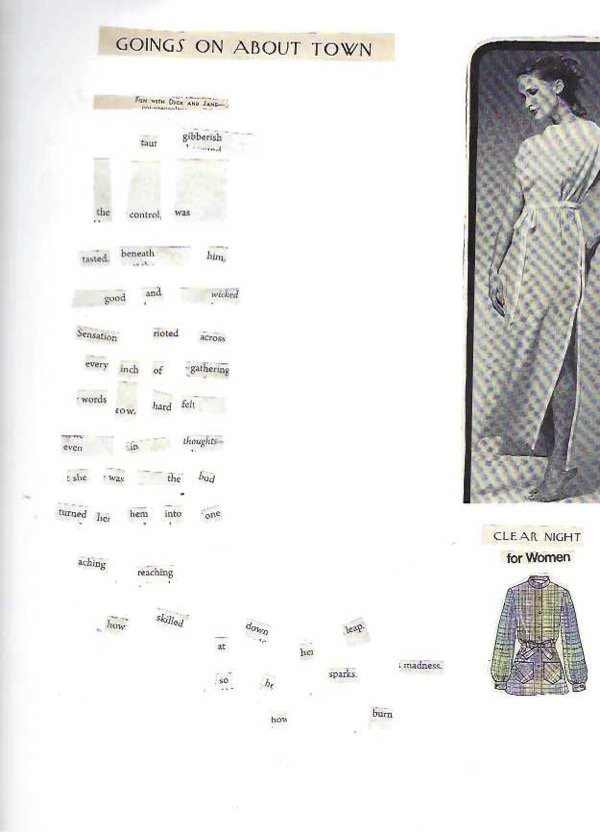
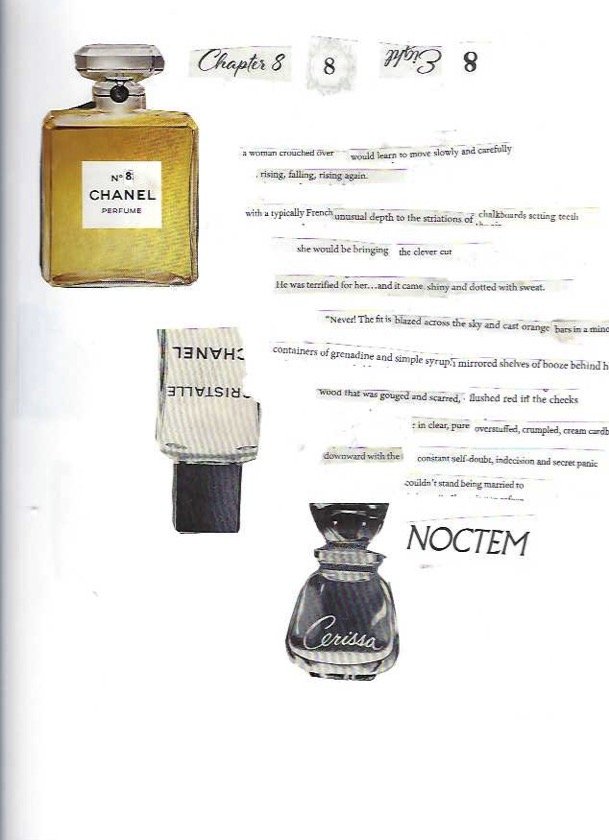

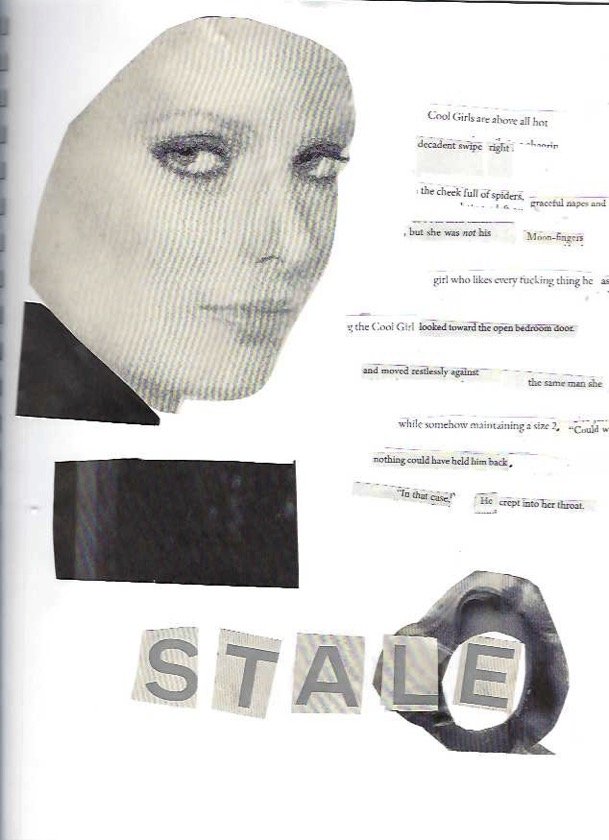
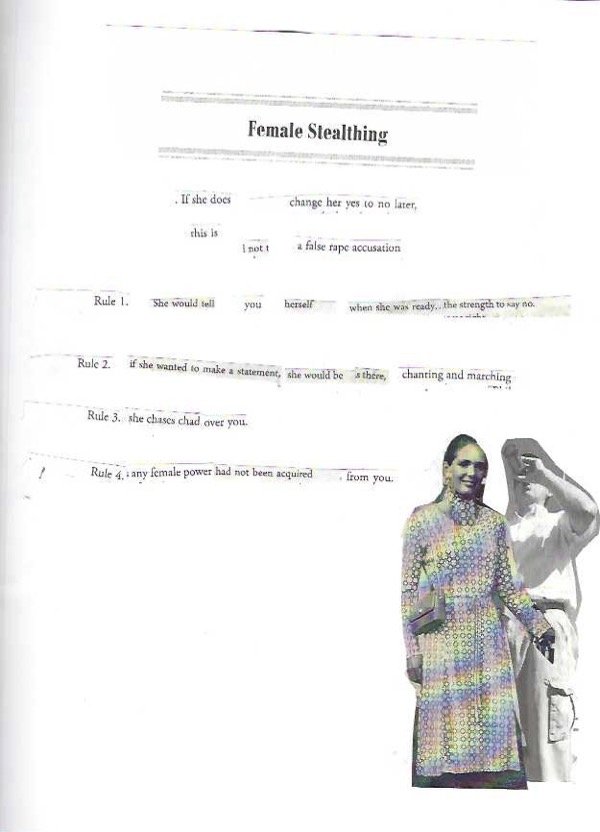
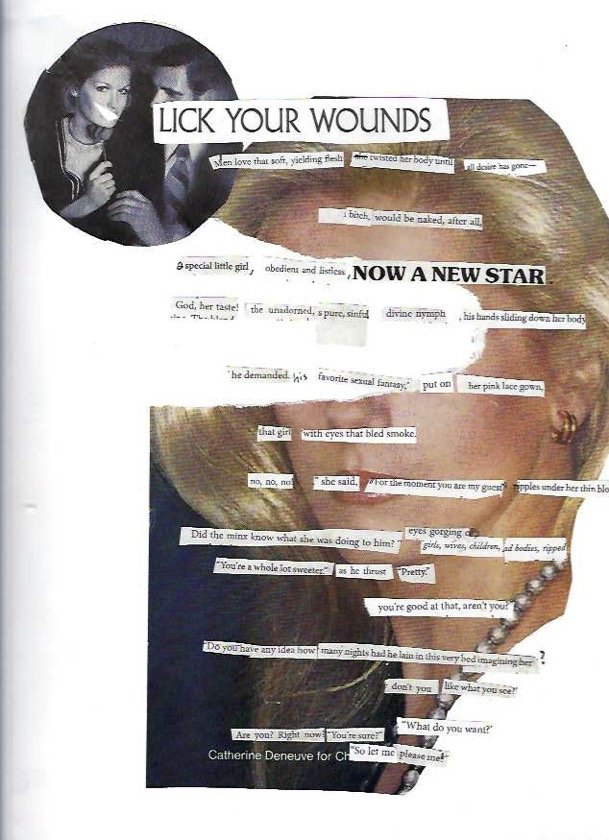

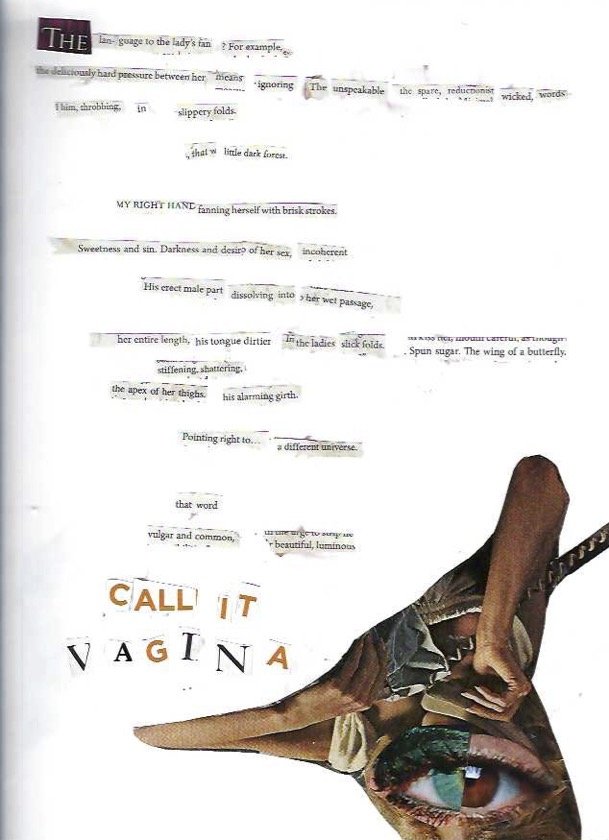
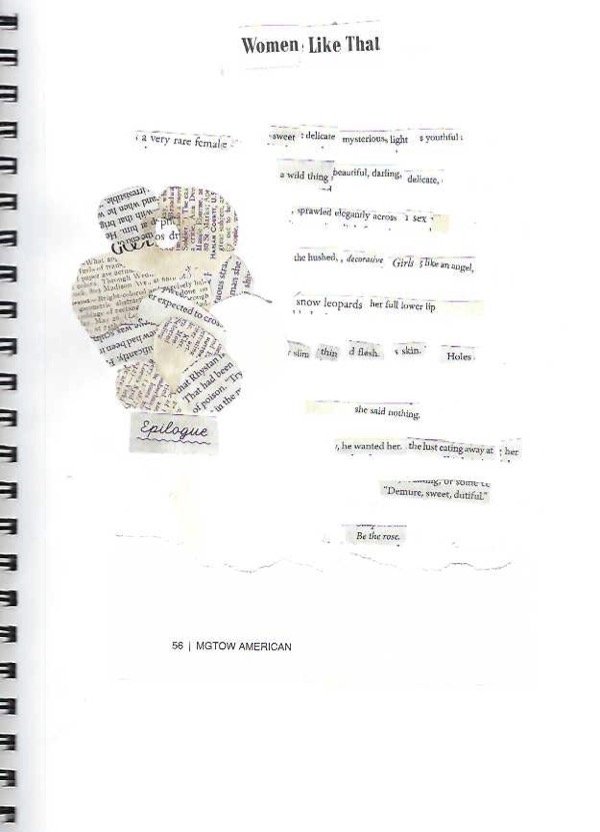
To ask an unassuming employee at Barnes and Noble where they keep the mass market romance is a vaguely humiliating thing. I felt uncomfortable and self-conscious, being sure to mention that I wasn’t reading them for fun, or anything—I would never pick up that sorry excuse for “literature” if I could help it. In doing so, I almost proved my own point. These novels marketed exclusively for women are purposefully embarrassing, purposefully taboo—they have awful-looking covers with half-naked men and titles like “Cowboy Firefighter Heat” to make sure the middle-aged woman picking up the title knows that her desire is something to be ashamed of. At the checkout, I made some wry joke about how excited I was to read these books, in case the person at the counter thought that I would actually read something like this. I walked out of the store clutching Cowboy Firefighter Heat, Flirting with Fifty, and The Princess Stakes. The mass market romances are produced at a dime a dozen, and every story is the same: an old flame returns to thin, pretty, main character’s life. The two are hesitant at first, but little by little, the strong, attentive, caring man breaks down slender main character’s walls until she’s ready to let him into her heart. The story always ends with a proposal. The epilogue shows off the honeymoon.
A woman walking into Barnes and Noble is embarrassed because she knows that these books are true romance, otherwise known as smut. These novels are focused intently on female pleasure, creating dream boys that always wait for their woman to come first. I love a good romance novel. I love fantasy stories with soulmates and high stakes by Sarah J. Maas, or sweet and heartfelt contemporary rom-coms like Emily Henry’s best. As I cut up these mass market romances, though, I almost felt sad. What strikes me is that women love to read these kinds of novels, especially middle-aged women, and their deepest fantasies are men who love them. They wish that men they’re attracted to would consider a woman’s pleasure during sex. And even in these books written by women, for women, the stories are marked by the male gaze. To be beautiful is, ultimately, to be young. In descriptions of women who had aged into adulthood, the male characters often described their beauty as youthful, delicate, thin. These descriptions are intimately concerned with the shape of the body, with the curve and the trim arm and the tight ass. Women wrote these novels and yet their descriptions of bodies are purely male, so interlocked within the conventions of beauty beneath a man’s eyes that I could not separate the two from each other.
Five poems into the collection, one of my roommates threw a package into my lap. It was addressed to Alpha Delta Pi, with no return address, and contained only a book entitled MGTOW AMERICAN: A Minimalist Guide to Becoming a Healthy Happy MGTOW. Our sorority had become the site of some fringe alt-right group propaganda. Flipping through the book, my eye immediately caught on a section entitled “Female Stealthing.” The author advised men to make a woman purchase condoms used during sex, as “if she changes her yes to a no later, you can then at least have a chance to prove she bought and supplied the condom to prove consensual sex.” The book was intimately concerned with protecting against the “common” occurrence of “false rape accusations.” While I was horrified and a bit enraged at the contents of the book, I was also overjoyed—what luck I had, to receive this handbook of the male gaze as I work on a project concerned with it. MGTOW, or Men Going Their Own Way, are men who believe that they must stay away from “females” entirely as they only see a man as a provider and therefore will take advantage of them. Females are “diversity hires” in the workplace who use “pussy power” to create false accusations of rape to have men removed from their job. Females want to trap men with children so that they can be provided for. Females want money above all else, so as a MGTOW grows more successful, they will attract more fiendish females looking to take from them.
I think the reclamation of power is integral in creating a collaged work. Cutting something up is a powerful feeling. Tearing a page out of a book you hated feels freeing. Suddenly, these words about women who are delicate, who need to get married to find happiness, are just words. We can make fun of the silly words authors use instead of vagina, and we can celebrate the emphasis of female pleasure in a mass market romance. The first poem in this collection is the first page of MGTOW paired with lines from the author’s notes of each romance novel I purchased, with words chopped from the UVA Arts Magazine. It’s easy to write off romance novels as silly and bad—which, sometimes, they are. But they’re also a reminder—and a reclamation—of feminine desire.
Pantoum I
I walk with head down through the streets,
rage blue-hot in the pit of my chest
I do not believe in kindness like I used to.
Truck driver wolf whistles as I walk past,
rage blue-hot in the pit of my breast, and
seriously, does he not realize that this is a cliche?
Wolf whistles from white pickup, quick step
down the side street, broad daylight or else
I fall victim to the cliche.
Final girl scream sobs, trips over her broken heels
down the alleyway, no daylight left to light the way
but she’ll make it, white prom dress reads like purity in the movies
final girl is silent scream as I sit in the parking lot;
lock the doors to keep the predator out, but
sometimes white gingham shirt reads like prey in the movies
sometimes he lets himself in through the front door
deadbolt the lock from the outside. learn to run.
I walk with head down in broad daylight.
It had been his door all along.
I do not believe in kindness like I used to.
Irish Wake
Wine legs twist and slither, down again,
and dark liquid scatters the moon—an incarnate
of ruby. My father always holds the glass by the stem.
The night air is flush with handheld garnet.
His tongue twists around tannins, around memory:
soft sounds of his just-passed fathers.
I have been grieving, too, though not thoroughly.
He takes a slow drink. Hand-written obituary, sisters, and brother;
all know they were not young. All know they are gone.
Teeth haloed in purple. When the liquid slides down
our throats, it is room-temperature air of dawn.
I wine-wonder if we can’t feel them—here. Around.
but the bottle is empty. We place the glasses in the sink.
We do not shed tears tonight: our respects for the still-living.
We Will Not Get Married in a Church
We will not get married in a church.
No vows to whisper beneath Jesus
and His bloody hands—
He made us like this,
lovers of women and kissers of men
My mother’s God tells us that love is
whatever you share with another
but the priest on the other side of the confessional
tells me that some sins cannot be forgiven.
We forgive him seventy times seven times
and turn to find nails in our palms on the seventy-first times seventh.
We wake with a crown of thorns around our heads.
We taste the blood as it falls onto our tongue.
It is not communion.
It is not an affirmation of faith.
We will not get married in a church.
We were raised in these pews.
Our knees flattened against the wooden beam,
air stained with light,
blood-oath written in the thin pages
of teen Bible; she does not believe
in my parents’ God.
We wish that we did not still believe.
We wish that belief did not feel like a betrayal.
We say our prayers before bed.
We ring around our rosaries.
Our Father, who art in heaven,
told us to love thy neighbor.
Our Father is my mother’s God.
The God in this church
would not consider us to be neighbors.
Worse even than our least favorite tax collector.
Worse even than the man
who puts an unwanted hand on my waist.
Worse even than the killer.
We will not get married in a church.
My mother’s God would not need to forgive us.
The priest on the other side of the confessional
asks us to consider praying for better guidance from Him.
My mother’s God is non-binary.
We ask for repentance,
for it has been far too long since our last confession.
We know that the sin is always the same.
We know that my mother’s God
would not need to forgive us.
We search for forgiveness anyways.
We pray to Saint Andrew
hoping he will find the faith we have lost.
We light a candle at the back of the nave
for a wedding we will never have.
Feminine Comforts
men never believe in ghosts.
my ear to the moss
gravestones like crooked teeth
breath trapped in my lungs
i tell the spirits
i hope they find somewhere
beautiful.
a plastic rosary forgotten
in a worn leather purse
i light a candle at the back of every church
i enter. tell my grandmother
that i love her, a cardinal
perched on a branch outside my window.
a pile of crystals on my windowsill
soaking up the light of the full moon.
rose quartz uncut in my palm,
pure quartz geode crusted with old clay,
my sister dug from the dirt
of our childhood backyard.
a relic from grassy knees &
dreams of archaeology.
obsidian, grey agate, black tourmaline.
all this for love.
for protection & support & for guidance.
bringing the darkness to light.
feminine comforts:
jade roller
horoscope
amethyst tower
God.
& what i mean is that i believe for the sake of it.
i believe just in case. i have been wondering
what is the harm in hoping i’ll go to heaven?
Jessica
It was the last day of school. Around the classroom, small hands twisted around backpack straps in readiness. Laughter seeped through the linoleum halls. Even the teachers seemed to smile easier with the expanse of summer break stretched out before them. The bell rang, and a great flood of children poured into the hallways. They chattered. Parted for Hall Monitors keeping watch at the entrance, split into smaller tributaries as they stomped up the steps to the bus.
It was the last day of school. Around the classroom, small hands twisted around backpack straps in readiness. Laughter seeped through the linoleum halls. Even the teachers seemed to smile easier with the expanse of summer break stretched out before them. The bell rang, and a great flood of children poured into the hallways. They chattered. Parted for Hall Monitors keeping watch at the entrance, split into smaller tributaries as they stomped up the steps to the bus.
I was in the bus marked 410. The chipped yellow paint seemed to gleam brighter in the early June sun as I ascended. Green leather and yellowed foam greeted me as I slid into my seat. The route was short for me, a straight shot back to my neighborhood and then the bus would loop the round-about at the end of the road and head towards the other side of town. When we were in elementary school, we used to have water balloon fights at the mouth of the neighborhood every year. Now, we were seventh graders—eighth graders, really, when we stepped off the bus—and didn’t bother with childish trifles.
Mark was having a pool party that evening. The tankinis of sixth grade had long since been declared ugly and lame, and when I slipped into the polyester blue bikini I bought with my mom at Target a few weeks before the end of school, I was surprised to see a hint of a curve where my hips met my waist. I was beginning to grow into my body, even the parts that had already begun to feel shameful: the chafe of my thighs against each other, or the small pouch of fat at the base of my stomach.
The pool party was the event of the year. I didn’t really think Mark was all that—we had grown up together and I still remembered the days when he was three inches shorter than me, but my friends had begun to blush when he came by to say hello during lunch. I never really thought any of the boys were cute, but I giggled along with the other girls when they tried to decipher who their next boyfriend would be.
“Ally! Hey,” Mark said. He was purposefully pitching his voice a few notes lower than it sat normally. “We have chips over there on that table.”
“Thanks,” I said. I threw down my towel and bag of extra clothes. If this had been the end-of-year party for sixth graders, I would have immediately cannonballed into the water. Mark and I probably would have had a competition to see who could make the biggest splash. His pool was fancier than the aboveground one we had at home—instead of a diving board, a stone staircase led up to a concrete platform that sent you splashing into the deep end.
Jessica was standing on the edge of the pool. She had long, curly hair and had been filling out a B cup since we were eleven. Girls used to talk about how she got her period before then, though, so I had always felt a little bad for her. Alex and a few of Mark’s other friends were splashing water at her feet, trying to get her to jump into the water. It was cooler to play coy, then, than it was to give in immediately.
The concrete was warm under my toes when I slipped off my flip flops. I couldn’t stop looking at how the sun brushed against Jessica’s curly hair, how it glinted off the plastic clasp of her bikini. It was hot pink and had rainbows over the cups. There was a tan line on her feet from the ankle-length Under Armour socks she wore during our lacrosse games. She always carried a cloud of Bath and Body Works perfume with her, Japanese Cherry Blossom fluttering into nostrils as she swept past.
I crossed my arms over my stomach when I shed the T-shirt and shorts that had served as my coverup. My skin was cool to the touch. Another girl on the lacrosse team had said that your stomach got cold when you were burning calories. I glanced at the chip table.
“Aren’t you going to come in?” Mark asked. He was standing at the top of the diving platform. I could count his ribs. His shoulders were knobby little things, knees on the top of his torso, and they already had begun to shine pink with the beginnings of a sunburn.
Jessica had turned to look at me. My cheeks pinked at the weight of her gaze.
“Y—yeah,” I said. The concrete grated against my uncalloused feet as I climbed the staircase.
“You’re acting weird,” Mark said. “Why are you standing like that?”
I had unconsciously crossed my arms over my stomach again. I laughed and turned away, back to the water, where Jessica had shielded her eyes from the sun to watch us jump. I never meant to look for her. My gaze had been drawn to her since the beginning of May, when she had started to wear spaghetti-strap camisoles to band class. She played the flute. I would stand with the snare drum and watch condensation form on the mouthpiece of the instrument as our class fumbled through a Star Wars medley.
“Cannonball contest?” I asked Mark. His eyes lit up. I found it strangely comforting—some things hadn’t changed, even as his knobby shoulders cleared the tips of my ears and his head hovered half a foot above my own.
“I’m going to win, you know,” he said. “It’s physics.”
“Like you have ever paid attention in a science class.”
He stuck out his tongue and launched himself off the platform, spraying everyone within two feet of the pool. I waited just long enough for him to get out of the way and sprung out behind him, feeling the air pull against me as gravity began to drag me into the water. The splash was epic, but I had been beat.
My head broke the surface of the water. A smile split the skin of my cheek. The bikini had miraculously stayed in place, and the water had doused the beads of sweat that had begun to form on my newly peach-fuzzed upper lip.
“So immature,” I heard from above. Jessica stood away from the water, her curly hair moistened by the water from the splash. She shook out her fingers. Pink polish glimmered in the sunlight, covered in drops of water.
The group of guys where Jessica had been standing moved to start a game of water basketball. Alex called to me, asked me to play with him. Jessica rolled her eyes and moved to sit with a group of girls gossiping on the wire tanning chairs scattered along the edge of the pool.
I splashed around with the boys I had spent most of my summers with. Their newly tall bodies were harder to defend than in past summers, but I had the added benefit of being short enough to duck beneath their lanky grasp and toss the ball into the tiny net set into the edge of the pool. They jabbered on all the while, talking about which girl looked the hottest in her swimsuit or how Manvi kissed Jeremy behind a shed at his birthday party two weeks ago. They never said that I looked the hottest, but I never really minded.
When the game would reset, I would twist to watch Jessica chat with the other popular girls in our grade. Thinning sunlight painted her prominent collarbones a soft shade of pink. Frosty highlighter glittered on her cheekbones. She had started wearing makeup when she switched to spaghetti straps. On the days she dressed up for school, she would leave a smudge of lip gloss on the cool silver mouthpiece of her flute. She had a nice mouth. Small, pouted, but hiding a brilliant smile and orthodontia-adjusted teeth.
I liked to watch her smile. I liked to watch her laugh in the crowd of girls at Mark’s party, head thrown back, jawline hidden by the openmouthed mirth she felt. I wanted to make her laugh like that. I wanted to be the reason why she laughed.
I just wasn’t totally sure why.
Moonrise 7/23
It all begins with an idea.
When the moon rises, its thin spoon is curved with yellow / blazing against my palms. They hug the copper belly of the telescope and / its cool dark eye draws a wavering glimpse of Saturn’s rings. / The edge of the sky yawns hazy and green / against the horizon. I want you to know / I am getting better. The instant of my gaze, light-speed and pressed / to the velvet dark of the night. I lost the space of my body / to his unclean hands. My only protector / the smoke-filled corner of my mind. The backs / of my eyelids. My breath. / All the starlight just a fire burning millions of miles away. / Alone in the night, darkness wide enough to drown in / but my body will remember how to swim. / I want you to know / I do not forgive you. I want you to know / I never will.
Ode to Jennifer Check
Hot pink pressed just above the navel,
candy hearts in your hand--the hallway parts
more than the sea does, lake water sheen
as you break the surface, your hair ink spilling
against your bare back, skin glowing with
life, or maybe undeath, it doesn’t matter
because either way, you’re glowing,
and when your long fingers twist through
the thick dark strands, the water comes away pink,
like maybe it wants to be pretty like you are,
the slim curve of your shoulder
pebbling with goosebumps, steam curling away
from your skin, and do you want to play
boyfriend-girlfriend like we used to?
I will never use a lighter without kissing the flame
to my tongue, a tribute and a promise.
And when you shatter my windshield, put your lips
to the cuts on my fingertips, teach me how to fly
and I will fall to my knees at your altar—
you told me once that you were a God
and I believe you, I believe in you
and when the boys from the band
smell all this fresh blood in the water,
I will eat their hearts out with you.
Catalogue of Cardinals In Springtime
It all begins with an idea.
After Ross Gay
A cardinal hops on crooked toes,
the barren limbs of winter stretching
crackled fingers towards it--
to support it. My mother says
it is the spirit of my grandmother.
I saw one in Charlottesville:
a cardinal dressed in its muddied winter coat,
belly flushed with rose as it skittered past,
close enough for me to wonder
if spirits migrate like the birds do.
Nonna counted her blessings
like beads on her rosary, and from the way
this bird is poking her amber beak towards us,
I think it’s safe to assume she would want us to do the same.
That is to say: thank you to the birds,
to the cardinals who carry our lost love ones
and every passenger pigeon excommunicated
by the Catholic church. Thank you to forgiveness,
to every stuffy side room I sat in for
Confession, to three Hail Marys and two Our Fathers
because they are apparently enough
to wash away a full year of sin.
Thank you to washing away sin in the Sistine Chapel,
to neck strain and the soft scuffle
of footsteps trying not to make a sound,
thank you reverence,
thank you faith,
thank you footsteps
and thank you to Joseph Geefs
crafting a marble Lucifer with a furrowed brow
and a six pack, thank you for reminding me that
pretty isn’t synonymous with good--
Thank you to whatever God made me pretty, though,
and blind to irony. And, oh, mea maxima culpa!
How could I have waited this long to give thanks
to my hometown, to finding a piece of God
in the rope swing over the Patapsco,
to places I yearned to escape from but missed
as soon as they slipped into the rearview, and of course
I must give gratitude to my mother,
who has never received enough of it--
voice gossamer and warmed like spun sugar,
volunteering love as if Time is not a finite resource,
as if she has stared into the well
and the weight of her gaze alone was enough for Time to say,
damn, ok, please take a few more minutes,
because of course she is the Chosen One;
my mother, the Chosen one,
who drove two hours three times a week
to visit her mother,
whose cancer gnawed chipped canines through her ribcage
until Mercy--oh, thank you Mercy--
sent her down the river soft, in sleep.
Thanks to my Uncle Danny, too,
for the day of the funeral when he told eight-year-old me
that although the chicken soup of the bereaved
would be eaten with a spoon in polite society,
today would be an exception,
and then pulled Nonna’s good china
up to his chin and slurped, loudly,
gesturing for me to follow suit,
and so I drank until there was only a thin film of salt
coating the bottom of the bowl.
And of course, I would never forget to thank you,
for though our skeletons lost track of time within us
and our skulls split open like cantaloupes,
we petitioned my mother and found Time
to claw through the wreckage,
our fingers sticky with juice and sugar,
and found that the fruit resting inside was only a little rotten.
Thank you to the promise of sunny days,
even when I am reminded that this cantaloupe is still sad
on the honeyed bloom of the first spring afternoon.
Thank you sadness like a child’s blanket,
something to drape over folded shoulders,
something to keep warm;
thank you to the voice in my head,
shrill as it may be,
whose thin whine asks only that I try to survive.
Thank you to survival:
to hot red cardinal wings
fluttering in my veins, frantic and ever-beating,
to hollow bones; to my ancestors
who hop past in their feathery cages,
who migrate south in spring to see me
and whisper
I see you. I love you. Keep going.